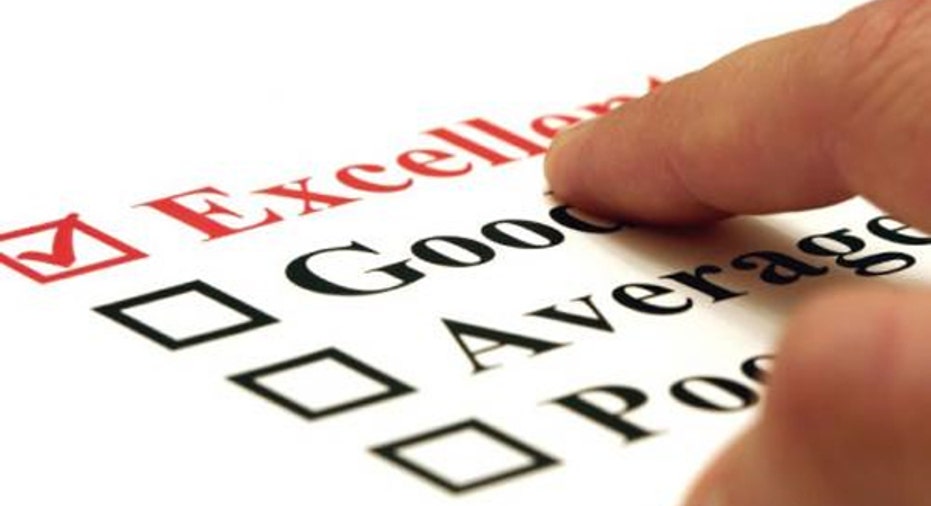Americans Score Higher on Credit Knowledge

Looks like consumers are learning from the financial crisis and Great Recession.
Credit scores--not the ones that indicate if someone is a good or bad credit risk--but those that show how knowledgeable we about using the credit world, soared last year.
“I’ve been doing consumer surveys for three decades and I have never seen such improvement in knowledge in a little more than a year,” says Steve Brobeck, executive director of the Consumer Federation of America (CFA).
Some questions in CFA’s annual “Credit Score Quiz,” which was conducted in conjunction with VantageScore Solutions, registered a 7%, 8% or 9% increase in the number of individuals choosing the correct answer. Brobeck attributes this to the implementation of new credit scoring rules and billing disclosures, as well as media coverage of credit issues in the past year. (Take the quiz yourself and see how smart you are by visiting here. There’s also a Spanish version.
For instance, three-quarters of consumers are aware that three credit bureaus collect data. More than 80% know it’s important to periodically check your credit report to confirm its accuracy.“Especially if you have a common name like ‘John Brown’ or ‘Ann Smith,’” says Brobeck. “That increases the chances that someone else’s data will end up in your file.”
Credit information is collected on approximately 200 million Americans and each bureau collects and stores this information separately, making it easy for mistake to happen. "That’s one of the reasons Congress required the three bureaus to give each consumer access to their file once a year for free- the check for accuracy.” (The official, i.e. guaranteed free, place to get this here.)
Since each credit bureau is required to give you one free credit report peek a year, consider rotating among the three credit bureaus every four months. The faster you spot and report a problem, the easier it is to correct it.
Note that you are not entitled to your credit score for free- just your credit “report” or history. To find out your actual score, you have to purchase it from one of the three credit bureaus- Experian, Tansunion, or Equifax.If you take this route, be careful not to sign up for services you don’t particularly want or need.
There are certain circumstances that allow you free access to your credit score: 1) you’re turned down for a loan or, 2) an existing loan or credit account is cancelled or the terms become less favorable (e.g. your interest rate is hiked). In addition to your actual score, the lender is required to tell you how they came up with the number, the credit reporting bureau that provided the information, and the top four items in your report that led to the denial for credit or a change in your terms.
Keep in mind that even if you pay to get your credit score, the number you receive from the three bureaus might vary. Each credit reporting agency relies on a different algorithm, which is a proprietary mathematical formula, to calculate scores. However, Brobeck cautions that any score you receive is just an approximation, and that major lenders like credit card companies and national banks, put their own twists on the data in your credit file to come up with their own customized number.
Although most of us consider “credit score” to be synonymous with “FICA score,” VantageScore, the new kid on the block calculating scores, is steadily gaining widespread acceptance, according to Brobeck
“People are used to FICO and think that “700” is a good score. But on the Vantage scale that’s mediocre.” While your FICA score is still used by mortgage companies, Brobeck says VantageScore “is increasingly used by other lenders.”
The point is, be sure you know whether the number you get is FICA or VantageScore because the scale used in each is vastly different.
Despite the fact that we’re getting smarter about credit issues, there’s still room for improvement. “Most people don’t understand how badly a low credit score can hurt you,” says Brobeck. Less than a third of those taking the quiz know that someone with a poor credit rating will end up paying $5,000 more on a $20,000 car loan. On a home mortgage, the difference can amount to tens of thousands of dollars.
Another common misunderstanding is that gender, age, marital status, or race/ethnicity factor into your credit score. According to Brobeck, this is problematic because “if you think your credit score is affected by your gender or age, you’re less likely to be motivated to try to improve it.”
Finally, stay away from those “friendly” credit repair companies that suggest they can help you boost your credit score. “You pay a high price for things you can do yourself,” warns Brobeck. Instead, look for a community-based, non-profit organization such as your local Consumer Credit Counseling Service.
Here are four ways to improve your credit score: - Pay your bills on time; - Don’t open a lot of new accounts within a short period of time; - Don’t max out your available credit, and try not to exceed 25% of your credit limit; - Check your credit file for accuracy at each of the three credit bureaus once a year.
Ms. Buckner is a Retirement and Financial Planning Specialist and an instructor in Franklin Templeton Investments' global Academy. The views expressed in this article are only those of Ms. Buckner or the individual commentator identified therein, and are not necessarily the views of Franklin Templeton Investments, which has not reviewed, and is not responsible for, the content.
If you have a question for Gail Buckner and the Your $ Matters column, send them to: yourmoneymatters@gmail.com, along with your name and phone number.



















